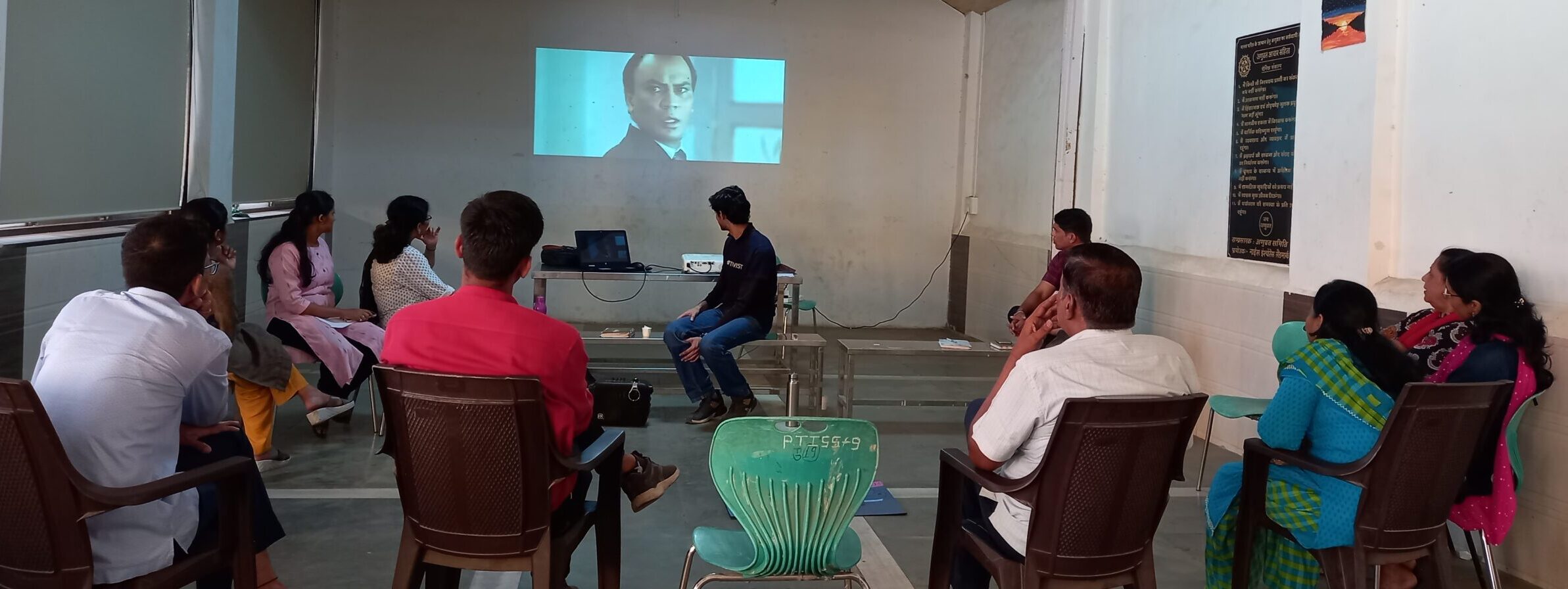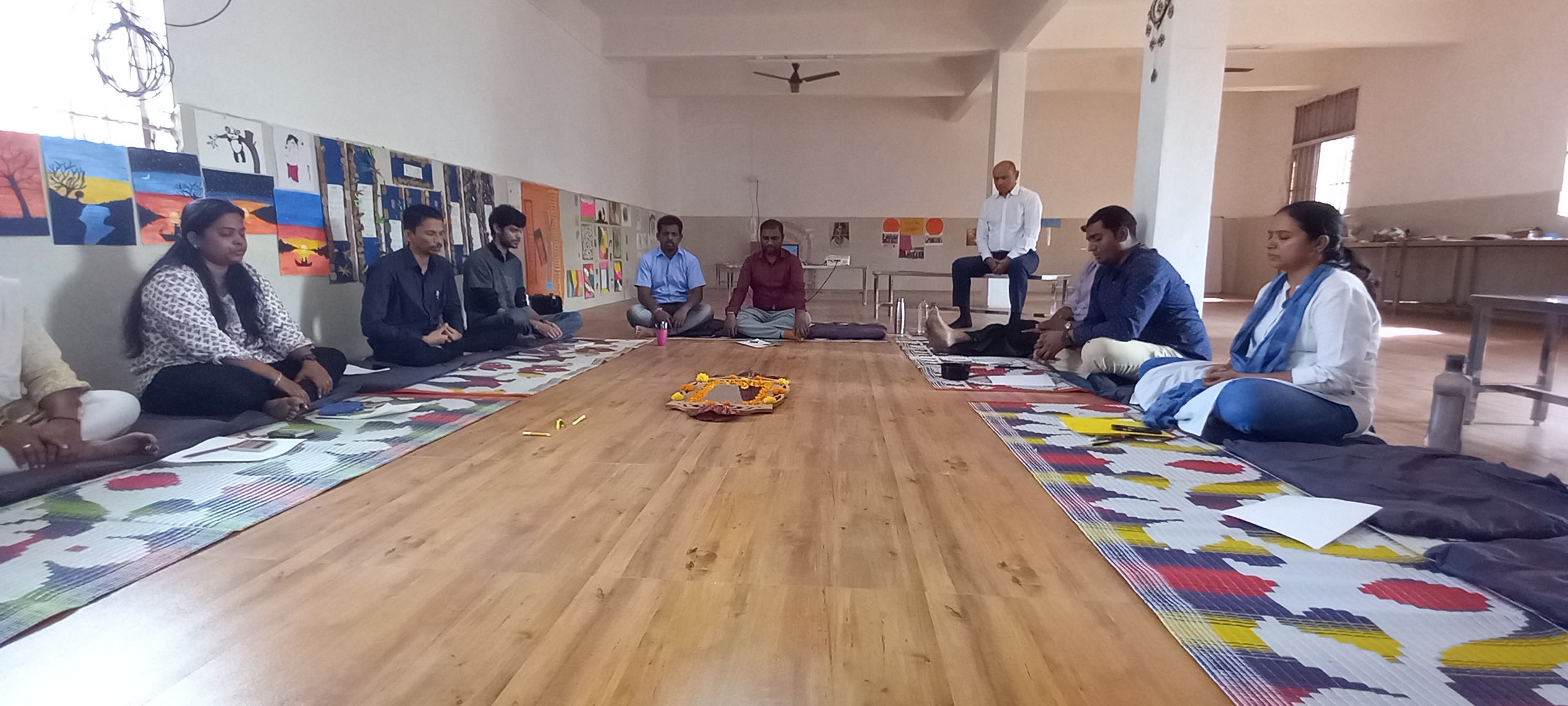“The opposite of courage in our society is not cowardice, it is conformity.” – Rollo May
Event Date: 14th May 2024
This session was more about understanding human psychology and factors that affect social behaviour than mental health itself, but we chose to name it mental health since this was a precursor to a staff session by Dr. Harish Shetty, a well renowned psychiatrist. We wanted to set a context and start the conversation around this topic before Dr. Harish Shetty came so that the interaction with him would be more meaningful. Towards the end of this session we collated all the questions that the staff had around mental health which they wanted to ask Dr. Shetty.
The session was a little different this time primarily because we took it in the hall of the boys section instead of our room so that it was more accessible and visible to everyone. However, this meant that the ambiance was not like our other staff sessions; it was a basic seating arrangement in a circle, but on chairs. There was no specific welcome gesture or a serene looking seating arrangement with cushions. We did not even have a proper centerpiece, we just kept a poster on Mental Health that we had created earlier. And this difference was felt by the staff – at the end of the session when we asked where we should take the next sessions, they promptly said “in your room because the ambiance is much better there!” Even though the setup was not as per our usual standards, the session itself went very well. The session format was also a little different since there wasn’t any major activity this time; it was mainly videos, discussions, and us talking. The turnout this time was very high – we had more than 15 staff members! This was a pleasant surprise for us, especially after our previous session, where the turnout was quite low!

In this session, we touched on 3 main topics which affect a person’s behaviour and thinking:
- Parenting & Childhood
- Negativity Bias – Brain Wiring (Evolution)
- Conformity, a Social Conditioning
We discussed the different forms of parenting and how they affect the child when he / she grows older. Most of the staff members could relate closely to these parenting methods since they are themselves parents. Their engagement was also high and we had a really nice discussion around parenting and its effects. They shared about how they were raised and also how they raise their children. They could see the correlations between parenting and the outcomes as discussed in the parenting theory.
Next, we introduced the topic of negativity bias and how we are wired to focus on negative inputs. Everyone immediately agreed to this and started sharing multiple personal stories where they have observed the negativity bias in their lives. They spoke about experiences at work, in social events, while shopping online, sports and so on! We showed them a couple of videos on how this can significantly affect a person, especially in a social setting and in day to day life. Collectively, we discussed how this plays out at the Dongri Home and how we need to be aware of our own biases. We also discussed how children might have this bias and hence we need to be a little empathetic towards their reactions.
Last aspect was the most interesting one, since we did a live demo of the Asch’s Conformity experiment and it was successful! We had placed 5 staff members as confederates who purposely gave the wrong answer and we were observing the response of the 6th person. They were supposed to select the line A, line B, or line C which they felt is equal to the line on the left (image below). The confederates all chose line C and because of that the last participant also chose line C to conform to the group. The rest of the staff members who were in the audience were given strict instructions to maintain silence during the experiment, however, we could feel the tension and unrest from them as all the participants of the experiment were answering. After the last participant chose C and the experiment ended, we disclosed what had just unfolded and there was a roar of surprise, awe and laughter within the entire group. They were simply mind-boggled! They couldn’t believe that someone would be pressured to fit in with others in such a way that they would give an incorrect answer to something as basic as this! The staff was also very surprised to know that we had managed to plant the confederates without anyone else knowing! We then discussed how dangerous this behaviour could be and how it becomes the root cause for so many wrong practices in the world as well as the Dongri Children’s Home. We spoke about the importance of being bold and going against the flow when we see something wrong happening. The live experiment became a very powerful experience for everyone and the message went through strongly.

This experiment was a big hit! We were glad that it worked out since even we did not know what the outcome would be. It was a bold attempt from our end, and in the end it was rewarded. We could see that the staff also appreciated our willingness to try new things and fail, and in the process collectively learn something new.
sometimes we have to leave the group to protect those who are standing behind us
After discussing these three aspects; parenting, negativity bias, and conformity and their effect on behaviour and thinking, we took a reflection circle on the concept of mental health and what they thought about it. There was a lot of openness to discuss about this topic, which generally is a taboo in such spaces. Infact, the staff themselves shared that it is very important that we openly talk about these things so that issues can be addressed early on and help can be given wherever needed. We were pleasantly surprised to see the conversation unfold.
Then, we asked the staff about their questions on mental health. We shared that we are collecting these questions so that we can discuss these when Dr. Harish Shetty comes. The session itself had created a fertile soil for these questions to emerge. We got some very genuine questions from them like, “Ladko ko kaise bata sakate hai ke unke kuch behavior unacceptable hai? (how do we tell the boys that their behaviour is unacceptable?)”, and “Kabhi kabhi field pe hame bhi gussa aajata hai ladko ke guse ki vajahse. Aise waqt par jab dono side gusse me hai tab situation ko kaise handle kare? (Sometimes even we get angry at the boys because they talk to us angrily or aggressively. How do we handle such situations where both sides are angry?)”, or “Jo ladke repeater hai aur bar bar aate hai unki mansikata kaisi hoti hai? Unhe wapas aana kyu achha lagata hai? (What is the mindset of the boys that come repeatedly? Why do they like to keep coming back?)”, etc. These questions got all of us into a reflection mode and there was a healthy discussion. We collected all their questions to address them at a later stage.

Finally, we closed the session with a short powerful video clip from the movie Taare Zameen Par, which we thought captured all three aspects of our session well. After watching the video, everyone was a bit emotional and took back the message strongly.




